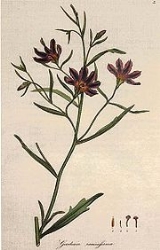
Goodeniaceae
Encyclopedia
Goodeniaceae are a family
of flowering plant
s in the order
Asterales
. It contains about 404 species in twelve genera. The family is distributed mostly in Australia
, except for the genus Scaevola
, which is pantropical
. Its species are found across most of Australia, being especially common in arid
and semi-arid
climates.
with spiral leaves
. Flowers have a single plane of symmetry (monosymmetric). Corolla lobes often look trilobed due to two marginal wings and are often divided down the middle. The ovary is inferior.
Family (biology)
In biological classification, family is* a taxonomic rank. Other well-known ranks are life, domain, kingdom, phylum, class, order, genus, and species, with family fitting between order and genus. As for the other well-known ranks, there is the option of an immediately lower rank, indicated by the...
of flowering plant
Flowering plant
The flowering plants , also known as Angiospermae or Magnoliophyta, are the most diverse group of land plants. Angiosperms are seed-producing plants like the gymnosperms and can be distinguished from the gymnosperms by a series of synapomorphies...
s in the order
Order (biology)
In scientific classification used in biology, the order is# a taxonomic rank used in the classification of organisms. Other well-known ranks are life, domain, kingdom, phylum, class, family, genus, and species, with order fitting in between class and family...
Asterales
Asterales
Asterales is an order of dicotyledonous flowering plants that includes the composite family and its related families.The order is a cosmopolite, and includes mostly herbaceous species, although a small number of trees and shrubs are also present.The Asterales can be characterized on the...
. It contains about 404 species in twelve genera. The family is distributed mostly in Australia
Australia
Australia , officially the Commonwealth of Australia, is a country in the Southern Hemisphere comprising the mainland of the Australian continent, the island of Tasmania, and numerous smaller islands in the Indian and Pacific Oceans. It is the world's sixth-largest country by total area...
, except for the genus Scaevola
Scaevola
Scaevola is a genus of flowering plants in the Goodenia family, Goodeniaceae. It consists of more than 130 tropical species, with the center of diversity being Australia and Polynesia, including Hawaii....
, which is pantropical
Pantropical
In biogeography, a pantropical distribution one which covers tropical regions of all of the major continents, i.e. in Africa, in Asia and in the Americas. Examples include the plant genera Acacia and Bacopa....
. Its species are found across most of Australia, being especially common in arid
Arid
A region is said to be arid when it is characterized by a severe lack of available water, to the extent of hindering or even preventing the growth and development of plant and animal life...
and semi-arid
Semi-arid
A semi-arid climate or steppe climate describes climatic regions that receive precipitation below potential evapotranspiration, but not extremely...
climates.
Morphology
Species in Goodeniaceae are generally herbaceousHerbaceous plant
A herbaceous plant is a plant that has leaves and stems that die down at the end of the growing season to the soil level. They have no persistent woody stem above ground...
with spiral leaves
Phyllotaxis
In botany, phyllotaxis or phyllotaxy is the arrangement of leaves on a plant stem .- Pattern structure :...
. Flowers have a single plane of symmetry (monosymmetric). Corolla lobes often look trilobed due to two marginal wings and are often divided down the middle. The ovary is inferior.
Genera
|
Lechenaultia Lechenaultia is a genus of plants in the Goodeniaceae family. Some species of this genus are used like ornamental plants. Lechenaultia species are diverse in form, they may appear as trees, shrubs, or small herbaceous plants.... R.Br. Robert Brown (botanist) Robert Brown was a Scottish botanist and palaeobotanist who made important contributions to botany largely through his pioneering use of the microscope... (syn. Leschenaultia DC.) Scaevola Scaevola is a genus of flowering plants in the Goodenia family, Goodeniaceae. It consists of more than 130 tropical species, with the center of diversity being Australia and Polynesia, including Hawaii.... L. Antonio José Cavanilles Antonio José Cavanilles was a leading Spanish taxonomic botanist of the 18th century. He named many plants, particularly from Oceania, his name is abbreviated as Cav... Velleia Velleia is a genus of herbs in the family Goodeniaceae. Of the 22 species, 21 are endemic to Australia, and one is endemic to New Guinea.Species include:*Velleia arguta R.Br.*Velleia connata F.Muell.*Velleia cycnopotamica F.Muell.... Sm. James Edward Smith Sir James Edward Smith was an English botanist and founder of the Linnean Society.Smith was born in Norwich in 1759, the son of a wealthy wool merchant. He displayed a precocious interest in the natural world... George Bentham George Bentham CMG FRS was an English botanist, characterized by Duane Isely as "the premier systematic botanist of the nineteenth century".- Formative years :... |

